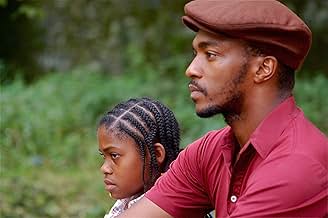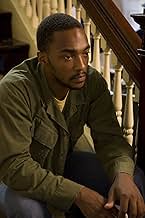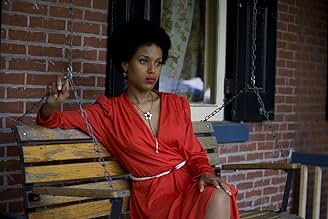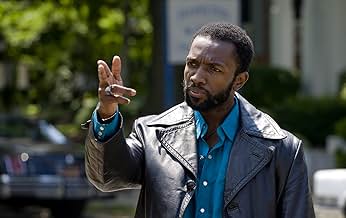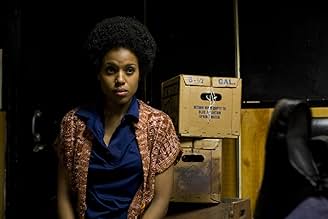NOTE IMDb
6,2/10
1,9 k
MA NOTE
Ajouter une intrigue dans votre langueIn 1976, complex political and emotional forces are set in motion when a young man returns to the race-torn Philadelphia neighborhood where he came of age during the Black Power movement.In 1976, complex political and emotional forces are set in motion when a young man returns to the race-torn Philadelphia neighborhood where he came of age during the Black Power movement.In 1976, complex political and emotional forces are set in motion when a young man returns to the race-torn Philadelphia neighborhood where he came of age during the Black Power movement.
- Réalisation
- Scénario
- Casting principal
- Récompenses
- 8 victoires et 19 nominations au total
Avis à la une
Night Catches Us (2010) is a movie I recently watched on Tubi. The storyline follows a man who returns home to his neighborhood after his father passes away. He wants to help his family fix-up the house but quickly comes to the realization he isn't wanted around by his former friends or family. There is one single mother who appreciates who he was and who he is and together they try to overcome some of their inner demons. This movie is directed by Tanya Hamilton (The Chi) in her directorial debut and stars Kerry Washington (Scandal), Anthony Mackie (Avengers), Ron Simons (27 Dresses) and Tariq Trotter (Yelling to the Sky). The storyline for this picture is very interesting and fun to watch unfold. There's numerous mysteries of each other's pasts for the two main characters that keep the audience intrigued. The acting is very good as is the cinematography, settings and backdrops. The character interactions also have the appropriate level of intensity. Overall, this is far from one of the best movies in this genre but is still worth a viewing. I'd score this a 6.5-7/10.
Watching this film was a deeply moving experience for me. So many times we think we know something about a certain period in history and time, but we don't have a real grasp of the impact the events had on real people, how deep it cut, and how people had to struggle to survive.
In 1976 Philly the remnants of Black Panther movement is transforming itself, and we get to watch how different people choose their directions in life. It was eye-opening to understand how these choices will play out in today's Philly, today's America, 35 years later. The tragic events of the early 70's are bleeding into the love triangle that evolves, and the pain is palpable, thanks to beautiful, thoughtful performances by Kerry Washington, Anthony Mackie and an overall very strong cast.
The director's approach to film-making is essentially European in storytelling style, she employs different visual media modes from documentary to animation without a cheesy effect, and the main characters are complex and believable.
The movie is easy to watch, you root for the people you meet in it, and it allows you to explore simple, yet important questions - how would you act under pressure, who would you choose above all, what sacrifices you would make in life and how do you live with the aftermath of your decisions. Leaving a movie theater and still pondering over these questions a few days later - now, that's a rare occurrence these days.
In 1976 Philly the remnants of Black Panther movement is transforming itself, and we get to watch how different people choose their directions in life. It was eye-opening to understand how these choices will play out in today's Philly, today's America, 35 years later. The tragic events of the early 70's are bleeding into the love triangle that evolves, and the pain is palpable, thanks to beautiful, thoughtful performances by Kerry Washington, Anthony Mackie and an overall very strong cast.
The director's approach to film-making is essentially European in storytelling style, she employs different visual media modes from documentary to animation without a cheesy effect, and the main characters are complex and believable.
The movie is easy to watch, you root for the people you meet in it, and it allows you to explore simple, yet important questions - how would you act under pressure, who would you choose above all, what sacrifices you would make in life and how do you live with the aftermath of your decisions. Leaving a movie theater and still pondering over these questions a few days later - now, that's a rare occurrence these days.
"Night Catches Us" is the best art-house film I've seen in several months. In fact it bests a lot of the current main-screen fare. It deserves better than the quiet and uneven release it seems destined for.
I saw it back-to-back with the Oscar contender "The King's Speech". It balanced the double bill reasonably well. Although "The King's Speech" is of course superior, the comparison wasn't simply ridiculous.
I saw it twice ...which I often do with films I really like, as I tend to miss too many things the first time.
It's not moralistic. Both sides of survival vs. justice, violence vs. pacifism, united front vs. paranoia, victims vs. victimizers, and this generation vs. the next generation are portrayed sympathetically. Although at first glance one particular style of being seems to be being touted over the others, just a little reflection reveals that the film actually revels in moral ambiguity. Some characters manage to stay on the good side of the respectability line at all times, even while their inner demons are picked up and expressed -sometimes in socially unacceptable ways- by others around them. The camera notices more latent contradictions than the story ever delves into. For example the reverend was apparently beloved by the neighborhood, yet also lived in by far the finest house in the whole area.
The film isn't a polemic and doesn't seem to consciously attempt to portray cops in a bad light. Yet it doesn't shy away from sketches of substantial police bad attitude and violence.
"Night Catches Us" makes liberal use of art-house stylistic conventions. For example the confused, tangled, and partially submerged thoughts of a character are portrayed not by talking about them or even by seeing them in action, but by long leisurely shots from underneath of the crossed branches of overgrown vegetation. For another example, a character's longing for stability and tranquility is portrayed by lengthy shots of the proverbial babbling brook.
I wasn't irritated by the pacing. The film is by no means an action flick or a taut thriller, but I didn't find it like watching paint dry either. I tend to like slower paced films anyway (which of course doesn't mean everybody else will too:-). The most similarly paced movie that comes to mind is Clint Eastood's recent "Hereafter"; if you thought that was impossibly slow you'll probably have the same reaction to "Night Catches Us", but if that character exposition and portrayal of small events grabbed you this likely will too.
All the action takes place over just a few days in 1976. A block of important events that happened about a decade earlier is described mainly through bits of dialog. There are no visual flashbacks nor dream sequences (except of course for the occasional interspersed archival Black Panthers footage).
I found the acting quite good. It doesn't bowl you over as the greatest thing you've seen in years; but it's by no means "just workmanlike". Quite often meaning is communicated not by dialog but by subtle body language or facial expressions, which the actors seem fully up to. Both the individual characters and the chemistry between the characters are believably convincing.
I found the situation (or plot if you prefer to think of it that way) simple and complex at the same time. It's simple in that once you finally grasp it you can describe the whole thing in one short paragraph, and in that if you're one of those people who instantly "get" most movie clues you might be able to divine the whole thing well in advance. On the other hand it's complex in that it's revealed only one tiny bit at a time -sometimes in dialog and sometimes visually- so the whole movie can become a "mystery" to be solved if that's your preference.
I saw it back-to-back with the Oscar contender "The King's Speech". It balanced the double bill reasonably well. Although "The King's Speech" is of course superior, the comparison wasn't simply ridiculous.
I saw it twice ...which I often do with films I really like, as I tend to miss too many things the first time.
It's not moralistic. Both sides of survival vs. justice, violence vs. pacifism, united front vs. paranoia, victims vs. victimizers, and this generation vs. the next generation are portrayed sympathetically. Although at first glance one particular style of being seems to be being touted over the others, just a little reflection reveals that the film actually revels in moral ambiguity. Some characters manage to stay on the good side of the respectability line at all times, even while their inner demons are picked up and expressed -sometimes in socially unacceptable ways- by others around them. The camera notices more latent contradictions than the story ever delves into. For example the reverend was apparently beloved by the neighborhood, yet also lived in by far the finest house in the whole area.
The film isn't a polemic and doesn't seem to consciously attempt to portray cops in a bad light. Yet it doesn't shy away from sketches of substantial police bad attitude and violence.
"Night Catches Us" makes liberal use of art-house stylistic conventions. For example the confused, tangled, and partially submerged thoughts of a character are portrayed not by talking about them or even by seeing them in action, but by long leisurely shots from underneath of the crossed branches of overgrown vegetation. For another example, a character's longing for stability and tranquility is portrayed by lengthy shots of the proverbial babbling brook.
I wasn't irritated by the pacing. The film is by no means an action flick or a taut thriller, but I didn't find it like watching paint dry either. I tend to like slower paced films anyway (which of course doesn't mean everybody else will too:-). The most similarly paced movie that comes to mind is Clint Eastood's recent "Hereafter"; if you thought that was impossibly slow you'll probably have the same reaction to "Night Catches Us", but if that character exposition and portrayal of small events grabbed you this likely will too.
All the action takes place over just a few days in 1976. A block of important events that happened about a decade earlier is described mainly through bits of dialog. There are no visual flashbacks nor dream sequences (except of course for the occasional interspersed archival Black Panthers footage).
I found the acting quite good. It doesn't bowl you over as the greatest thing you've seen in years; but it's by no means "just workmanlike". Quite often meaning is communicated not by dialog but by subtle body language or facial expressions, which the actors seem fully up to. Both the individual characters and the chemistry between the characters are believably convincing.
I found the situation (or plot if you prefer to think of it that way) simple and complex at the same time. It's simple in that once you finally grasp it you can describe the whole thing in one short paragraph, and in that if you're one of those people who instantly "get" most movie clues you might be able to divine the whole thing well in advance. On the other hand it's complex in that it's revealed only one tiny bit at a time -sometimes in dialog and sometimes visually- so the whole movie can become a "mystery" to be solved if that's your preference.
I saw one review on this twisted history movie and had to say something. I lived in this era, I saw the Black Panthers kill a lot of people.I lived in Oakland I saw them burning buildings for no reason except they didn't like the school or the people. I saw them beating up teachers who were trying to help them. The only people killed by these so called 'civilians' were other civilians. The hate was incredible, Oakland turned from a thriving metropolis to a town of empty stores, with newspapers flying in the streets. My whole family lived there my Grandparents were born there and my folks, the town was decent it was full of hard working people. Then the haters moved in and started destroying everything. The city did not help they torn down the Victorian homes that were solid and built slums that had rats within 30 days of occupation because the garbage was everywhere. I saw a whole city implode by shooting and gangs the panthers were just one of many; they were just more talked about than the rest. Anyone who thinks the government was wrong helping the Vietnamese people get away from communist aggression didn't hear the cries for help from them when their cities were destroyed and the people killed in the thousands. We lost only because Congress wouldn't let the military do their job and complete their mission. I know many people from south east Asia that would love to go back to their country if they could worship the way they wanted to without being harassed by the communist regime. Communism isn't pretty! people also forget that the era was full of drugs and immorality it wasn't good and didn't do anything to advance civilization in fact I think it went back a few steps! Docudramas are the bargain basement of movies they take 10 percent real history and 90 percent baloney and everyone thinks it really happened that way! Don't waste your time!
"Night Catches Us" is a movie written and directed by Tanya Hamilton. It seeks to tell the story of a Philadelphia neighborhood and how it was shattered by the police killing of a Black Panther Party member. The movie takes place in 1976 where we see Marcus Washington (Anthony Mackie) returning home to a cold welcome for his father's funeral. There are those who are angry with him for running away, and those who are angry with him for being a snitch. Nothing is really clear to begin with though it becomes a little clearer later on. He's at odds with Dwayne Miller (Jamie Hector) over "snitching," and he's at odds with his brother Bostic (Tariq Trotter) and his secret flame Patricia (Kerry Washington) over disappearing. By the end we find out why he was labeled a snitch and why he disappeared.
This movie suffered from a weak script and an uncompelling plot. It's not a good thing when the best parts of your movie are archive footage and photos. It looked as if Tanya Hamilton was attempting to pay a tribute to the Black Panther Party, but she did the complete opposite. What we saw from ex-members and current wannabes was an organization that left people broken and confused. It was like all ex-members and allies were directionless without the Party, kind of like this movie. As if the legacy of the Party was poor, angry Black folks who were destined to remain poor and angry.
The movie attempted to be deep and poignant with the partial conversations and emotional pleas, but it never got past the surface of what the Party meant and what they were about. "Night Catches Us" may have been about a prodigal son returning, but he and all of the other characters were so hollow. There was nothing to them except that they were Black, had a connection to the Party, and had a death hanging over them of one of their members years ago.
It's hard to say just what Hamilton intended with this movie. She got quality actors in Mackie, Washington, and Hector, but that only takes you so far. Given the subject matter this movie could've been, and should've been so much better.
This movie suffered from a weak script and an uncompelling plot. It's not a good thing when the best parts of your movie are archive footage and photos. It looked as if Tanya Hamilton was attempting to pay a tribute to the Black Panther Party, but she did the complete opposite. What we saw from ex-members and current wannabes was an organization that left people broken and confused. It was like all ex-members and allies were directionless without the Party, kind of like this movie. As if the legacy of the Party was poor, angry Black folks who were destined to remain poor and angry.
The movie attempted to be deep and poignant with the partial conversations and emotional pleas, but it never got past the surface of what the Party meant and what they were about. "Night Catches Us" may have been about a prodigal son returning, but he and all of the other characters were so hollow. There was nothing to them except that they were Black, had a connection to the Party, and had a death hanging over them of one of their members years ago.
It's hard to say just what Hamilton intended with this movie. She got quality actors in Mackie, Washington, and Hector, but that only takes you so far. Given the subject matter this movie could've been, and should've been so much better.
Le saviez-vous
- AnecdotesThis movie reunites Anthony Mackie and Kerry Washington who previously starred together in Spike Lee's 2004 film 'She Hate Me.'
- GaffesThe film is supposed to take place in 1975, but the blue Chevy Caprice police car is a 1986-1990 model.
- ConnexionsReferenced in IMDb's 20th Anniversary Star of the Day: Anthony Mackie (2010)
Meilleurs choix
Connectez-vous pour évaluer et suivre la liste de favoris afin de recevoir des recommandations personnalisées
- How long is Night Catches Us?Alimenté par Alexa
Détails
- Date de sortie
- Pays d’origine
- Sites officiels
- Langue
- Aussi connu sous le nom de
- Stringbean and Marcus
- Lieux de tournage
- Sociétés de production
- Voir plus de crédits d'entreprise sur IMDbPro
Box-office
- Montant brut aux États-Unis et au Canada
- 76 185 $US
- Week-end de sortie aux États-Unis et au Canada
- 13 562 $US
- 5 déc. 2010
- Montant brut mondial
- 76 185 $US
- Durée1 heure 30 minutes
- Couleur
- Mixage
Contribuer à cette page
Suggérer une modification ou ajouter du contenu manquant

Lacune principale
By what name was Night Catches Us (2010) officially released in India in English?
Répondre

